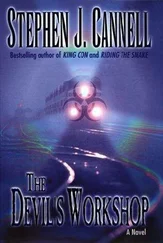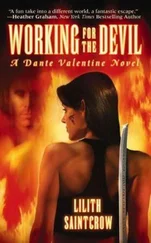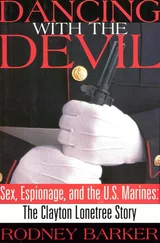Алан Джадд - The Devil's Own Work
Здесь есть возможность читать онлайн «Алан Джадд - The Devil's Own Work» весь текст электронной книги совершенно бесплатно (целиком полную версию без сокращений). В некоторых случаях можно слушать аудио, скачать через торрент в формате fb2 и присутствует краткое содержание. Жанр: sf_mystic, на английском языке. Описание произведения, (предисловие) а так же отзывы посетителей доступны на портале библиотеки ЛибКат.
- Название:The Devil's Own Work
- Автор:
- Жанр:
- Год:неизвестен
- ISBN:нет данных
- Рейтинг книги:3 / 5. Голосов: 1
-
Избранное:Добавить в избранное
- Отзывы:
-
Ваша оценка:
- 60
- 1
- 2
- 3
- 4
- 5
The Devil's Own Work: краткое содержание, описание и аннотация
Предлагаем к чтению аннотацию, описание, краткое содержание или предисловие (зависит от того, что написал сам автор книги «The Devil's Own Work»). Если вы не нашли необходимую информацию о книге — напишите в комментариях, мы постараемся отыскать её.
The Devil's Own Work — читать онлайн бесплатно полную книгу (весь текст) целиком
Ниже представлен текст книги, разбитый по страницам. Система сохранения места последней прочитанной страницы, позволяет с удобством читать онлайн бесплатно книгу «The Devil's Own Work», без необходимости каждый раз заново искать на чём Вы остановились. Поставьте закладку, и сможете в любой момент перейти на страницу, на которой закончили чтение.
Интервал:
Закладка:
I believe I am the only person other than those intimately involved ever to have seen that manuscript. Edward showed it to me. It is handwritten in faded brown ink on old laid paper. The writing is small and dense and the longer strokes very thin. It is in English and the individual letters are clearly formed and recognizable, yet of the whole I could make no sense; I could not read it. Admittedly, it was in my hands for only a few seconds and it may be that I simply wasn't concentrating, but I don't think so because Edward's early reactions were like mine. Those thousands upon thousands of thin spiky strokes gave me an uncomfortable sensation of nonsense, pernicious nonsense that was nevertheless tempting because at the same time it seemed that it could be made to mean something. And so it did for Edward; but it may be that you have to have the ambition to be a great writer before it will speak to you.
Chapter 4
As I have said, it was years before I knew of the manuscript and that early time in London passed rapidly. Much of life is just one thing after another and it is hard to form any sort of reliable perspective. Yet this attempt to recall what became, without my realizing it, the great theme of my life forces me to adopt one, however rough and ready. In those early years Chantal and I married, worked, saw family and friends, read newspapers and books, went to theatres and cinemas, had holidays, moved up a rung or two of the property ladder and generally led that busy metropolitan life that seemed at the time so urgent and full and is now so largely forgotten.
Edward prospered. Not only did he write a lot but he struck a seam that was ready to be mined, at least by those concerned with literary fashion. He became a leading writer among what were then known as the post-modernists, exponents of something called 'fictive realism' according to which reality and fantasy had the same status. This resulted in writers thinking that they could write what they liked, that they had no obligation to convince or render, that they need not discriminate except on grounds of what pleased them. The cause of this was a failure of imagination, or of belief in the power of imagination to interpret life, and it led to contempt for the reader. It had, I think, an intellectual justification at the time, a supposedly absolute scepticism which maintained that since reality was no more to be trusted than fantasy nothing could be finally proved — whatever that meant. Naturally, the writers and critics who believed this could do so only by walling themselves in behind a new absolute greater than any they claimed to attack, which was their sense of their own rightness. Their scepticism did not extend that far.
You may think that I was opposed to this movement, but far from it. It was only later that I came to see it as a betrayal and to believe that truth in art matters, that part of the role of art is to help us to hear what cannot usually be heard amidst all the noisy nonsense in which we live. I know I am old-fashioned — I who was so keen to be contemporary — but I have been made so by experience. It was the new truths that failed me, not the old ones, and I do now believe that anything that confuses reality and unreality, or that attempts to equate the two, is the devil's own work.
At the time, though, I was all for everything new.
Flattered by Edward's friendship, I talked isms over drinks in Clapham gardens on Sundays, read what the reviews said I should, saw the plays and films that other people saw, thought what they thought, went eagerly to dinner parties. I was the very type of the modern philistine. To her credit, I think that for Chantal the whole business was more an act than it was for me; she wasn't taken in, and anyway posing came more naturally to her. She simply enjoyed it, whereas I thought it mattered. Perhaps I was already a little dull.
Though a leading exponent of the new writing, Edward was not a theoretician. In fact, I don't think I ever heard him espouse any particular theory. He simply put them into practice and during any discussion of theory, or even of other contemporary writers, he would smile and shake his head as if it were all above him, which gave the impression that it was in fact all below him. He kept his flat in that gloomy Kennington house even when he lived mainly abroad and could have bought the whole street. At one stage he owned a house in Chelsea as well and used the flat as a hideaway for work since in Chelsea he was besieged by telephone calls or business. But in those early years he continued to live there and I continued to call round, as before I was married. Sometimes Chantal would come but more often we were alone, unless one of his girlfriends was there. He was pretty ruthless about getting them out of the way but they became more a feature of his life than they had been. In fact, after those few days in Villefranche he became busier in every department of his life: he wrote more, saw more people, did more reviewing, sampled more women, appeared more often on radio and television and so became a national figure, at least so far as those who make a profession of the arts were concerned. I used to think that anyone who wrote much would have correspondingly less time for everything else, and once said so.
'No,' he said, with a decisive shake of the head. 'When the writing goes well, everything else goes well.'
What puzzled me more was that his succession of women continued after Eudoxie had moved in. It may even have increased. But there was more than that that was puzzling about Eudoxie.
I met her the night I first heard the writing. I had no idea she was living with him — he had never mentioned her — and I had called round to ask him to sign a copy of his second novel which I was giving to a friend. It had won one of the minor literary prizes and was, I think, the book that first prompted comparisons between Edward and Tyrrel. These were made not so much on grounds of literary similarity as in terms of their gifts for trendsetting; Edward was already showing signs of being ahead of the game. There were important differences in approach but the results were curiously alike. Whereas Tyrrel had first attracted attention by his style and had then refined his subject-matter almost to nothing so that towards the end, with the exception of his last book, an ever-more extravagant style was virtually all there was, Edward paid little apparent attention to style but advanced himself under cover of an artillery barrage of ideas, scenes, characters and caricatures. He mixed the real with the surreal and fact with fantasy in successive salvoes of such intensity and energy that the reader had no time to recover and discriminate. He wrote with a zest and wit that bamboozled judgement to the extent that critics no longer looked coolly at what was being said but let themselves be overwhelmed by the saying of it, just as with Tyrrel. When one or two started to talk of him as succeeding to the place in contemporary letters vacated by Tyrrel the rest joined in and soon they were competing with each other in the extravagance of their claims.
Edward took a rather wry attitude towards it all, appearing neither to endorse nor to disclaim. I even found myself telling people that success had not changed him and in some ways I was right: he lived and worked in the same place, I visited as before, our friendship seemed unaltered. Perhaps that was because it had always been less deep than I used fondly to think, no more than an occasional acquaintance so far as Edward was concerned, though there were other elements later. Certainly, that night I took the book for signing all appeared as usual. We talked over coffee and I gave him the book. He had met the friend it was for and so said he would add an inscription of his own.
I sat in the tubular-framed chair and Edward sat at his desk, his swivel chair turned side-on and his pen above the open book. He had paused while thinking what to say and my eye wandered round the white walls and the shelves of shiny books. I never could get used to the room being so antiseptic, so lacking in human warmth. I heard the scratching of pen on paper and looked back at Edward. His pen was motionless an inch or two above the open page yet the scratching continued. I looked around the room for some other source of noise but it was impossible to believe it was anything else. It had the rhythm of someone writing rapidly and regularly; I could tell long and short words and punctuation marks. The paper sounded coarse and the nib cruder than a modern one, like the sort you used to have to dip in the ink, or like a quill. The silence that always inhabited the room served to emphasize the thin, unremitting scratching.
Читать дальшеИнтервал:
Закладка:
Похожие книги на «The Devil's Own Work»
Представляем Вашему вниманию похожие книги на «The Devil's Own Work» списком для выбора. Мы отобрали схожую по названию и смыслу литературу в надежде предоставить читателям больше вариантов отыскать новые, интересные, ещё непрочитанные произведения.
Обсуждение, отзывы о книге «The Devil's Own Work» и просто собственные мнения читателей. Оставьте ваши комментарии, напишите, что Вы думаете о произведении, его смысле или главных героях. Укажите что конкретно понравилось, а что нет, и почему Вы так считаете.











